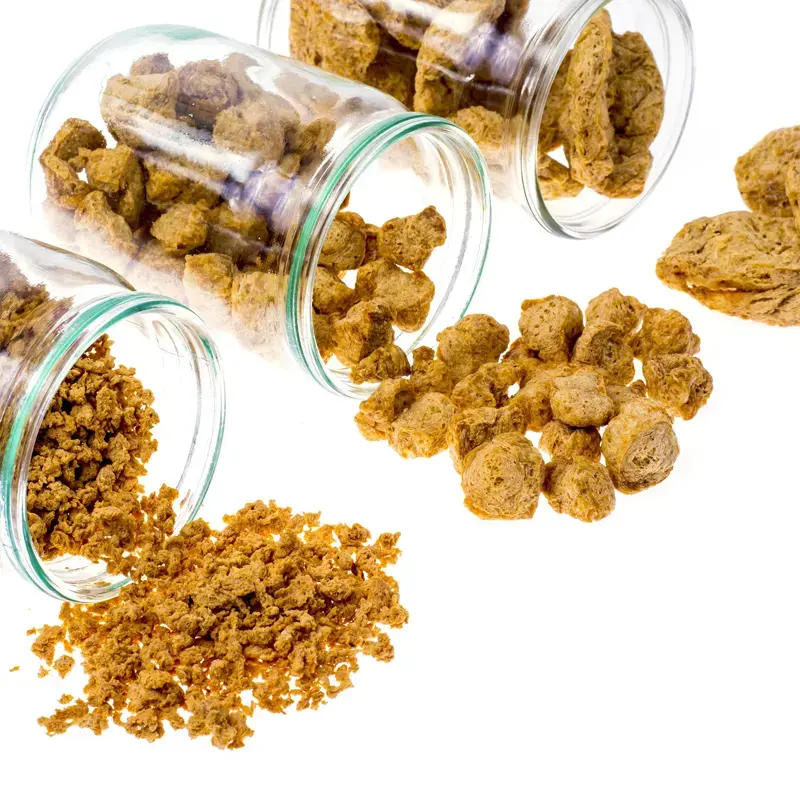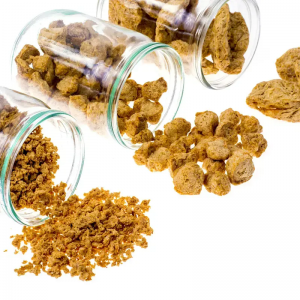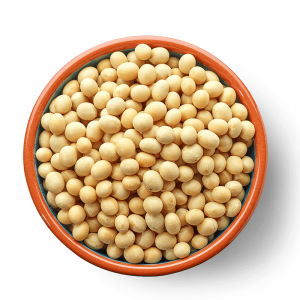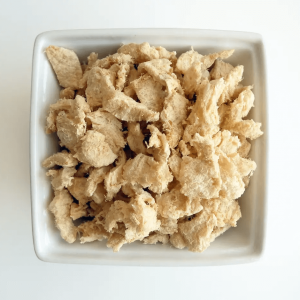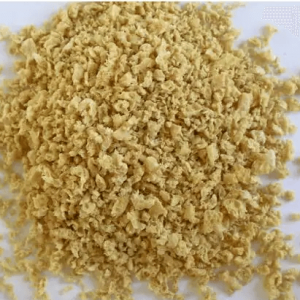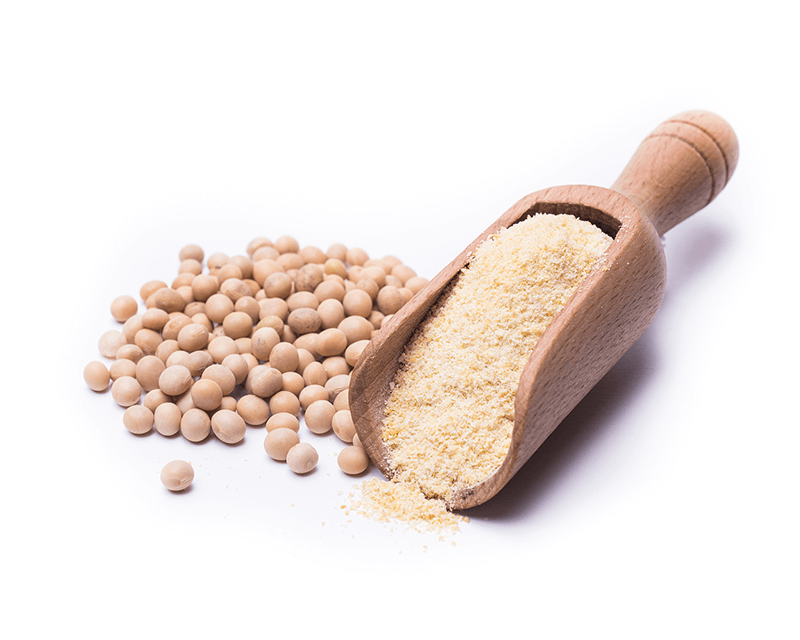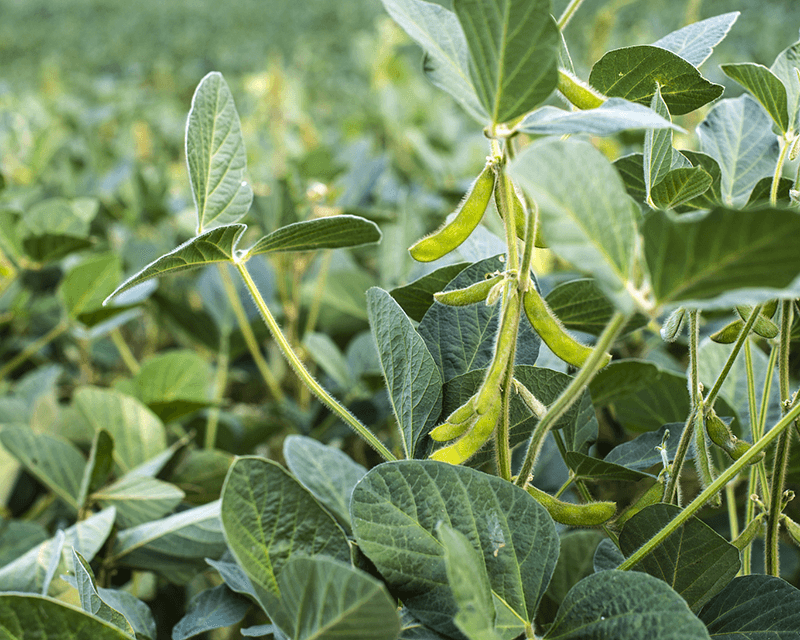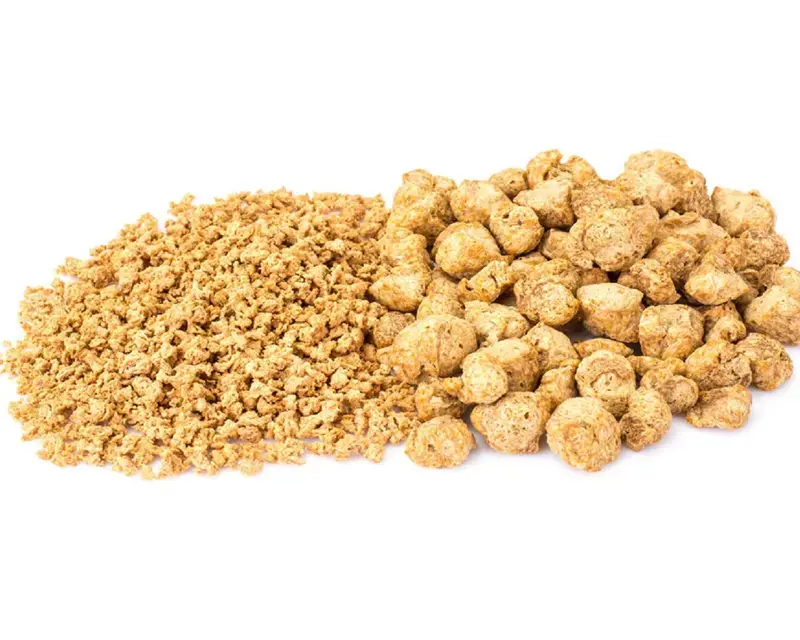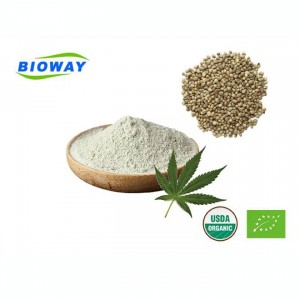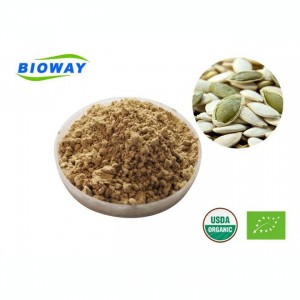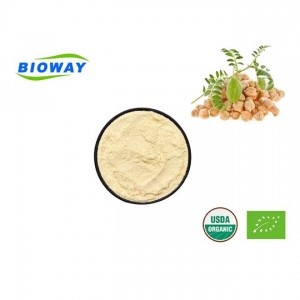Organic Textured Soy Protein
Organic Textured Soy Protein(TSP), also known as organic soy protein isolate or organic soy meat, is a plant-based food ingredient derived from defatted organic soy flour. The organic designation indicates that the soy used in its production is grown without the use of synthetic pesticides, chemical fertilizers, or genetically modified organisms (GMOs), adhering to the principles of organic farming.
Organic textured soy protein undergoes a unique texturization process where the soy flour is subjected to heat and pressure, transforming it into a protein-rich product with a fibrous and meat-like texture. This texturing process allows it to mimic the texture and mouthfeel of various meat products, making it a popular substitute or extender in vegetarian and vegan recipes.
As an organic alternative, organic textured soy protein offers consumers a sustainable and environmentally friendly protein source. It is often used as a versatile ingredient in a range of culinary applications, including burgers, sausages, chili, stews, and other plant-based meat alternatives. Additionally, organic textured soy protein is a nutritious choice, being low in fat, cholesterol-free, and a good source of protein, dietary fiber, and essential amino acids.
| Item | Value |
| Storage Type | Cool Dry Place |
| Specification | 25kg/bag |
| Shelf Life | 24 months |
| Manufacturer | BIOWAY |
| Ingredients | N/A |
| Content | Textured soy protein |
| Address | Hubei, Wuhan |
| Instruction for use | According to your needs |
| CAS No. | 9010-10-0 |
| Other Names | Soya protein textured |
| MF | H-135 |
| EINECS No. | 232-720-8 |
| FEMA No. | 680-99 |
| Place of Origin | China |
| Type | Textured Vegetable Protein Bulk |
| Product name | Protein/Textured Vegetable Protein Bulk |
| Shelf Life | 2 Years |
| Purity | 90% min |
| Appearance | yellowish powder |
| Storage | Cool Dry Place |
| KEYWORDS | isolated soy protein powder |
High Protein Content: Organic textured soy protein is an excellent source of plant-based protein. It contains all essential amino acids required by the body. Protein is essential for muscle building, repair, and maintenance, as well as supporting overall growth and development.
Heart-Healthy: Organic TSP is low in saturated fat and cholesterol, making it a heart-healthy choice. Consuming foods low in saturated fat may help reduce the risk of heart disease.
Weight Management: High-protein foods, like organic TSP, can help promote feelings of fullness and satiety, thereby aiding in weight management and reducing calorie intake. It can be a valuable addition to weight loss or maintenance plans.
Bone Health: Calcium-fortified organic textured soy protein contains essential minerals such as calcium and magnesium, which are beneficial for bone health. Incorporating this protein source into a balanced diet can contribute to maintaining healthy bones and reducing the risk of osteoporosis.
Lower in Allergens: Soy protein is naturally free from common allergens such as gluten, lactose, and dairy. This makes it suitable for individuals with dietary restrictions, allergies, or intolerances.
Hormonal Balance: Organic TSP contains phytoestrogens, compounds similar to the hormone estrogen found in plants. These compounds may help balance hormone levels in the body. However, it is essential to note that the effects of phytoestrogens can vary among individuals.
Digestive Health: Organic TSP is rich in dietary fiber, which supports a healthy digestive system. Fiber promotes regular bowel movements, aids in digestion, and contributes to a feeling of fullness.
It's important to note that individual nutritional needs and sensitivities may vary. If you have specific health concerns or dietary restrictions, it is recommended to consult a healthcare professional or registered dietitian before incorporating organic textured soy protein into your diet.
Organic textured soy protein, produced by our company as a manufacturer, boasts several key product features that set it apart in the market:
Organic Certification: Our organic TSP is certified organic, meaning it is produced using sustainable and organic farming practices. It is free from synthetic pesticides, chemical fertilizers, and GMOs, ensuring a high-quality and environmentally friendly product.
Texturized Protein: Our product undergoes a special texturization process that gives it a fibrous and meat-like texture, making it an excellent plant-based alternative to traditional meat products. This unique texture allows it to absorb flavors and sauces, providing a satisfying and enjoyable eating experience.
High Protein Content: Organic TSP is a rich source of plant-based protein, making it an ideal choice for those seeking a protein-packed diet. It contains all the essential amino acids needed for optimal health and is suitable for vegetarian, vegan, and flexitarian lifestyles.
Versatile Culinary Applications: Our organic textured soy protein can be used in a variety of culinary applications. It can be incorporated into recipes for vegetarian burgers, meatballs, sausages, stews, stir-fries, and more. Its neutral flavor works well with a range of spices, seasonings, and sauces, allowing for endless creative possibilities in the kitchen.
Nutritional Benefits: In addition to being protein-rich, our organic TSP is low in fat and free from cholesterol. It also contains dietary fiber, aiding in digestion and promoting a healthy gut. By choosing our product, consumers can enjoy a nutritious and balanced diet while reducing their environmental impact.
Overall, our organic TSP stands out as a high-quality, versatile, and sustainable option for individuals looking for a plant-based protein alternative with a texture and taste akin to meat products.
Organic textured soy protein has various product application fields across the food industry. Here are some of the common uses:
Plant-Based Meat Alternatives: Organic textured soy protein is widely used as a key ingredient in plant-based meat alternatives. It is particularly popular in products like veggie burgers, vegetarian sausages, meatballs, and nuggets. Its fibrous texture and ability to absorb flavors make it a suitable substitute for meat in these applications.
Bakery and Snack Foods: Organic textured soy protein can be used to enhance the protein content of bakery items such as bread, rolls, and snacks like granola bars and protein bars. It adds nutritional value, and improved texture, and can even extend the shelf life of these products.
Prepared Meals and Frozen Foods: Organic textured soy protein is commonly used in frozen meals, ready-to-eat entrees, and convenience foods. It can be found in dishes like vegetarian lasagna, stuffed peppers, chili, and stir-fries. The versatility of organic textured soy protein allows it to adapt well to various flavors and cuisines.
Dairy and Non-Dairy Products: In the dairy industry, organic textured soy protein can be utilized to create plant-based alternatives to dairy products like yogurt, cheese, and ice cream. It provides structure and texture while increasing the protein content of these products. Additionally, it can be used to fortify non-dairy milk beverages like soy milk.
Soups, Sauces, and Gravies: Organic textured soy protein is often added to soups, sauces, and gravies to enhance their texture and increase protein content. It can also act as a thickening agent in these applications while providing a meaty texture similar to traditional meat-based stocks.
Food Bar and Health Supplements: Organic textured soy protein is a common ingredient in food bars, protein shakes, and health supplements. Its high protein content and versatility make it ideal for these products, providing a nutritional boost for athletes, fitness enthusiasts, and individuals seeking protein supplementation.
These are just a few examples of the application fields for organic textured soy protein. With its nutritional qualities and meat-like texture, it has vast potential in many other food products as a sustainable and plant-based protein source.
The production process of organic textured soy protein involves several key steps. Here is a general overview:
Raw Material Preparation: Organic soybeans are selected and cleaned, removing any impurities and foreign matter. The cleaned soybeans are then soaked in water to soften them for further processing.
Dehulling and Grinding: The soaked soybeans undergo a mechanical process called dehulling to remove the outer hull or skin. After dehulling, the soybeans are ground into a fine powder or meal. This soybean meal is the primary raw material used for producing textured soy protein.
Extraction of Soybean Oil: The soybean meal is then subjected to an extraction process to remove soybean oil. Various methods can be used, such as solvent extraction, expeller pressing, or mechanical pressing, to separate the oil from the soybean meal. This process helps reduce the fat content of the soybean meal and concentrates the protein.
Defatting: The extracted soybean meal is defatted further to remove any remaining traces of oil. This is typically done using a solvent extraction process or mechanical means, reducing the fat content even more.
Texturization: The defatted soybean meal is mixed with water, and the resulting slurry is heated under pressure. This process, known as texturization or extrusion, involves passing the mixture through an extruder machine. Inside the machine, heat, pressure, and mechanical shear are applied to the soybean protein, causing it to denature and form a fibrous structure. The extruded material is then cut into desired shapes or sizes, creating the textured soy protein.
Drying and Cooling: The textured soy protein is typically dried to remove excess moisture and ensure long shelf life stability while maintaining its desired texture and functionality. The drying process can be accomplished using various methods such as hot air drying, drum drying, or fluid bed drying. Once dried, the textured soy protein is cooled and then packaged for storage or further processing.
It's important to note that specific production methods may vary depending on the manufacturer and the desired characteristics of the organic textured soy protein. Additionally, additional processing steps, such as flavoring, seasoning, or fortification, may be incorporated as per the requirements of the final product application.
Storage: Keep in a cool, dry, and clean place, Protect from moisture and direct light.
Bulk Package: 25kg/drum.
Lead Time: 7 days after your order.
Shelf Life: 2 years.
Remark: Customized specifications also can be achieved.
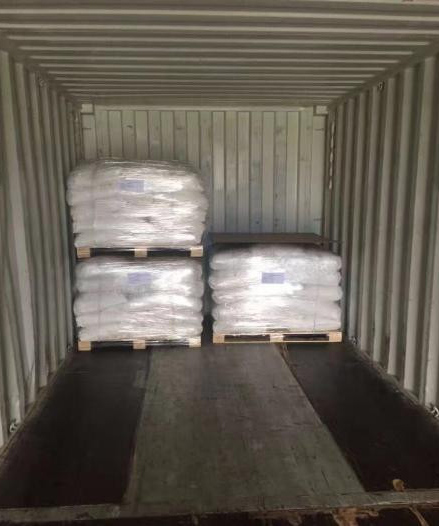
20kg/bag 500kg/pallet

Reinforced packaging

Logistics security
Express
Under 100kg, 3-5Days
Door to door service easy to pick up the goods
By Sea
Over300kg, Around 30 Days
Port to port service professional clearance broker needed
By Air
100kg-1000kg, 5-7Days
Airport to airport service professional clearance broker needed

Organic Textured Soy Protein is certified with the NOP and EU organic, ISO certificate, HALAL certificate, and KOSHER certificate.

Organic textured soy protein and organic textured pea protein are both plant-based protein sources commonly used in vegetarian and vegan diets. However, there are some differences between them:
Source: Organic textured soy protein is derived from soybeans, while organic textured pea protein is obtained from peas. This difference in source means they have different amino acid profiles and nutritional compositions.
Allergenicity: Soy is one of the most common food allergens, and some individuals may have allergies or sensitivities to it. On the other hand, peas are generally considered to have a low allergenic potential, making pea protein a suitable alternative for those with soy allergies or sensitivities.
Protein Content: Both organic textured soy protein and organic textured pea protein are rich in protein. However, soy protein typically has a higher protein content than pea protein. Soy protein can contain around 50-70% protein, while pea protein generally contains around 70-80% protein.
Amino Acid Profile: While both proteins are considered complete proteins and contain all essential amino acids, their amino acid profiles differ. Soy protein is higher in certain essential amino acids like leucine, isoleucine, and valine, while pea protein is particularly high in lysine. The amino acid profile of these proteins may affect their functionality and suitability for different applications.
Taste and Texture: Organic textured soy protein and organic textured pea protein have distinct taste and texture properties. Soy protein has a more neutral flavor and a fibrous, meat-like texture when rehydrated, making it suitable for various meat substitutes. Pea protein, on the other hand, can have a slightly earthy or vegetal taste and a softer texture, which may be more suited to certain applications like protein powders or baked goods.
Digestibility: Digestibility can vary between individuals; however, some studies suggest that pea protein may be more easily digestible than soy protein for certain people. Pea protein has a lower potential for causing digestive discomfort, such as gas or bloating, compared to soy protein.
Ultimately, the choice between organic textured soy protein and organic textured pea protein depends on factors such as taste preference, allergenicity, amino acid requirements, and intended application in various recipes or products.





